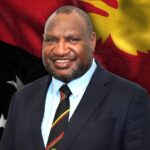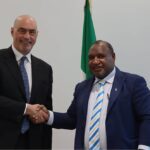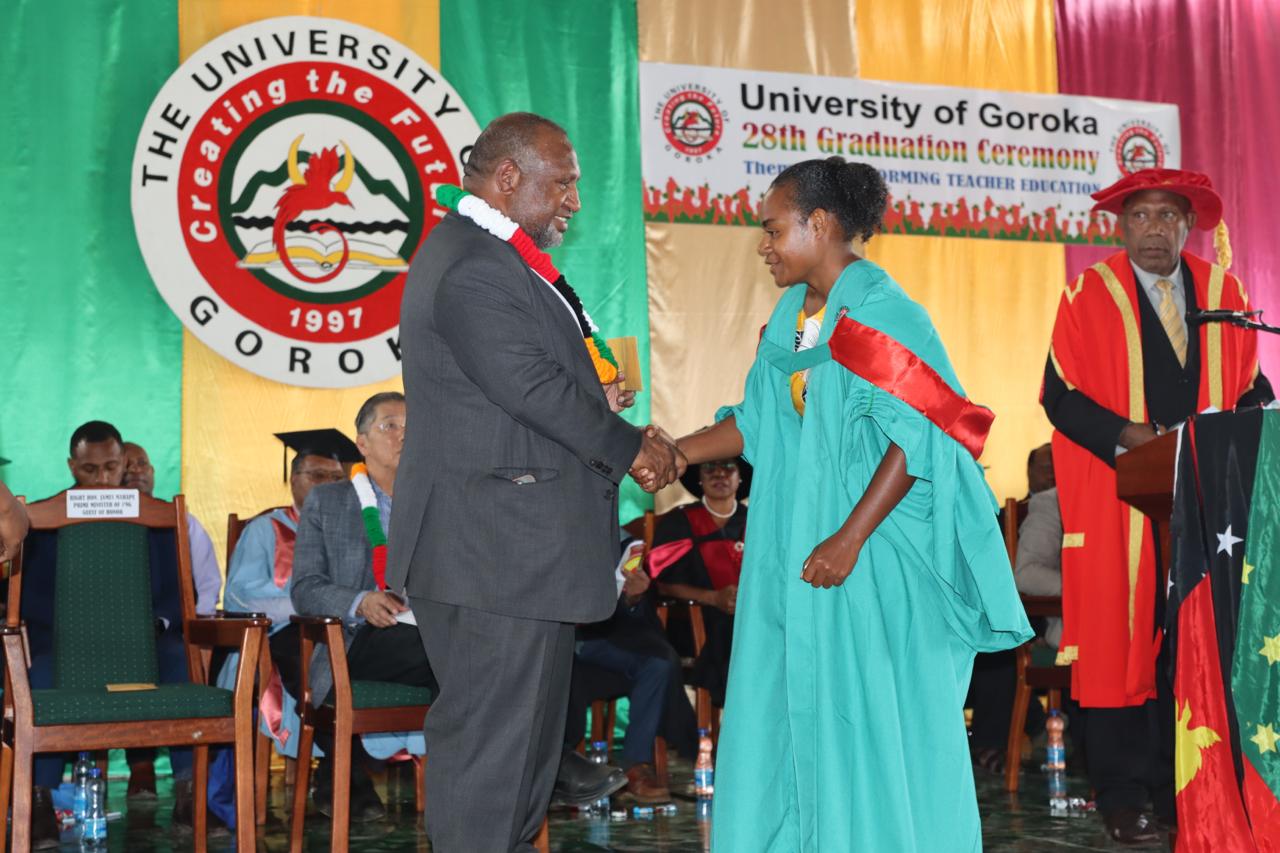Prime Minister Hon. James Marape has reaffirmed the Government’s unwavering commitment to Papua New Guinea’s educators, announcing substantial improvements to teachers’ remuneration as the nation approaches its 50th Independence Anniversary in 2025. Speaking at the 28th Graduation Ceremony of the University of Goroka (UOG) today, the Prime Minister shared his vision for a stronger future driven by the empowerment of educators.
Prime Minister Marape’s address was a powerful reminder of the critical role educators play in nation-building. As Papua New Guinea prepares to celebrate 50 years of independence, his message resonated with the graduating class and attendees alike—a call to action for the nation to uplift its teachers and, in doing so, secure a brighter future for all.
“Our teachers must be among the highest-paid public servants in our country,” Prime Minister Marape said.
“It is simple rationale that teachers must be looked after. That’s why I come to you today, to tell all of you here—future teachers—and those already serving in the field, that on the 50th anniversary of our nation’s independence, teachers’ work conditions and remuneration will be one of our key priorities.”
The Prime Minister reflected on his tenure as Education Minister in 2008 and 2009, during which he pushed for teachers’ pay to reflect their qualifications—a policy now being implemented by the Teaching Service Commission and the Department of Education.
In a moment of inspiration, he emphasised the profound influence educators have on shaping the nation’s future. “It is logical: if we want to incubate a better Papua New Guinea, we must look after our teachers at all levels—from elementary teachers to university lecturers. I give this commitment as part of the reform strategies we will announce on September 16, 2025, our nation’s
50th anniversary. Teachers’ working conditions will be improved so you can serve our country without fear or favor, adhering to your code of conduct and ethics as patriots strengthening our nation through the students who pass through your hands.”
Quoting Proverbs 22:6, Prime Minister Marape reminded the audience of the timeless wisdom in nurturing future generations: “Train up a child in the way he should go, and when he is old he will not depart from it.”
In a major announcement, the Prime Minister committed to easing the financial burden on aspiring teachers.
“I also want to announce to all students training to become teachers in our country that, from 2026 onwards, your government will pay your full tuition fees,” Prime Minister Marape said to resounding applause.
“Any Grade 12 school leaver who chooses to become a teacher can rest assured that your tuition will be fully covered by your government. Provincial governments , districts, or other sponsors can assist with boarding and lodging, but the full tuition cost will be borne by your government. This applies to those pursuing early childhood education, primary and secondary teaching, and even college and university lecturing.”
The Prime Minister went on to outline key expectations for the teaching profession under the new reforms.
“The Government is committed to improving the welfare of teachers by increasing their pay and covering their school fees for those who choose to pursue teaching as a profession. However, with this commitment comes a responsibility. The Teaching Service Commission will ensure that all teachers employed meet the highest ethical and professional standards.We do not want individuals with questionable character —
such as gamblers, habitual troublemakers, or those engaged in unethical practices — influencing our children. We want to build a new culture within the teaching profession, one that priorities decency, discipline, and professionalism. Teachers must carry themselves in a manner that sets a positive example for their students, both inside and outside the classroom.”
Drawing from his personal experience, the Prime Minister highlighted the impact of teachers on his own life.
“I am a product of the teachers who instructed me from Grade 1. Their discipline, guidance, and example played a significant role in shaping my character and values, which I carry with me to this day. It is this same level of commitment and influence that we expect from today’s teachers.”
Prime Minister Marape also called on the Education Department to collaborate with universities to fast- track teacher training programmes.
“I urge the Education Department to work closely with institutions such as the University of Goroka, University of Papua New Guinea, and PNG University of Technology to quickly roll out programmes that will address the teacher shortage. For graduates in specialised fields, a one-year diploma in teaching can equip them with the necessary skills to enter the classroom quickly.”
He concluded by reaffirming the Government’s commitment to increasing both the number and quality of teachers across the country.
“We are committed to increasing the number of teachers in our country , but it’s not just about quantity — it’s about quality. We will ensure that teachers are well-trained, well-supported, and held to a high standard so they can give their best to the students and to the country.
“The teaching profession is a noble one, and we want to make sure that every teacher understands the critical role they play in nation-building. By investing in teachers, we are investing in our nation’s future. In return, we expect teachers to uphold the highest standards of conduct and professionalism to inspire the next generation of leaders.”







